高级英语第二册第五课第一部分
高级英语第二册-lesson-5-Love-is-a-fallacy-para-31-52PPT课件
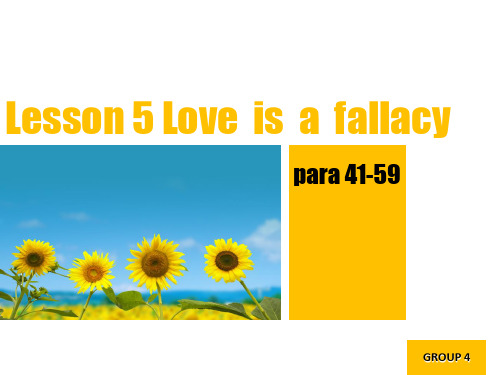
Throw open: (1) to open sth suddenly and forcefully 突然打开 (2) to open up 开放
unpleasantly surprised 惊骇;使…战悚
E.g. They were horrified by the outrage ['aʊtredʒ] before their
eyes. 他们被亲眼所见的暴行吓得呆住了。
Fling : [flɪŋ] v. throw with force or recklessness 掷,抛;
share files anonymously [ə'nɑnəməsli] . 直到有谨慎的用户建议匿名共享文件网络流量才开始恢复 。
Mince : [mɪns] (1) v. make less severe or harsh 矫揉做作地说;走小碎步 (2) v. cut into small pieces 切碎 n. food chopped into small bits 切碎物
Paraphrase He said firmly.
Be in the swim : (1) 合时髦;合潮流;熟悉内情;积极参加活动 (2) 积极参加社交活动
E.g.
Although I'm retired, voluntary work keeps me in the swim
of things. 我虽已退休,但仍做些义务工作,以便了解当前的情势。
我在一把椅子上坐了下来,假装读书,暗暗地瞟着皮蒂。 他神情不安,用面包店窗前的流浪儿那种馋涎欲滴的神情 望着那件皮大衣。
高英第二册第五课love is a fallacy
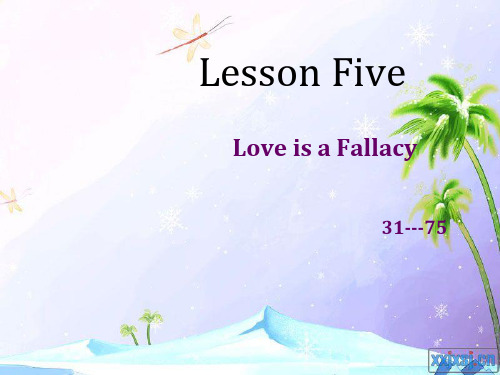
virtually zero interest rates is waning.
与此同时,在几乎是零利率的情况下持有现金的需求正 在减弱。
• vi.1.(月)亏,缺 • 2.变暗淡;变弱;减少 • 3.衰落;衰退;没落
• 炮塔的火炮可在一分钟内旋转一周。
• wax 2 [wæ ks] vt.渐渐变大;渐渐增多(月亮)渐 圆,渐盈变为,to wax angry发怒
n.增大,变大;增加(月亮)渐圆,渐盈
• 1.on the wax 正在变大;在增加
• 2.wax and wane
• (月亮的)盈亏(或圆缺)
wax 1 [wæ ks]n.蜡,蜂蜡,蜡状物vi.给…上蜡,给… 涂蜡,把…灌制唱片adj.蜡制的;似蜡的
• His dad had been out of the picture since he was eight.
• 自从他8岁时起,他的爸爸就一直不在其中。
• get at够得着,查明,意指
• We want to get at the truth. Who killed him? And why?
• 我踉跄了几步,不得不抓住一把椅子扶稳。 • (因为害怕或焦虑而) 抓牢
• wink [wɪŋk] vi. 眨眼;使眼色;闪烁 • n. 眨眼;使眼色;闪烁;瞬间 • vt. 眨眼
• I gave her a wink. • 我向她眨了眨眼。
• I didn't get a wink of sleep on the flight. • 我在飞行过程中没有合一下眼。
• 我们想查明真相。谁杀了他?为什么?
高级英语第二册LESSON5课后答案

Ⅱ .1.The younger generation of the 1920s were thought to be wild because they visited speakeasies, denounced Puritan morality, etc. (See para. 1).2. "Yes" and "no Yes" because the business of growing up is always accompanied by a Younger Generation Problem, "no" because all their actions can now be seen in perspective as being something considerably less sensational than the degeneration of jazz mad youth.3. Yes. Youth was faced with the challenge of changing the standards of social behavior, of rejecting Victorian gentility. But in America the young people tried to escape their responsibilities and retreat behind and air of naughty alcoholic sophistication and a pose of Bohemian immorality.4. The revolt was logical and inevitable because of the conditions in the age. First of all, the rebellion affected the entire Western world. Second, people in the United States realized their country was no longer isolated in either politics or tradition and that they could no longer take refuge in isolationism.5. All the activities mentioned above were means to help the young people to escape their more serious responsibilities of changing society and most young people went in for these activities. It became a general pattern of behavior.6. The war whipped up their energies but destroyed their naivette. It made them cynical. They could not fit themselves into postwar society so they rebelled and tried to overthrow completely the genteel standards of behavior.7. Intellectuals and non-intellectuals began to imitate the pattern of life set by those living in Greenwich Village. These people lived a Bohemian and eccentric life. They defied the law and flouted all social conventions. They attacked the war, Babbittry, and "Puritanical" gentility.8. These young intellectuals wanted America to become more sensitive to art and culture, less avid for material gain, and less susceptible to standardization.9. They emigrated to Europe because there "they do things better" than in the United States where people only care for money and wealth. Only in Europe will they be able to find remedy for their sensitive minds.10. They were called the "lost generation" by Gertrude Stein because they were troubled and worried and had emigrated to Europe. But they were never really lost for they finally returned to America and produced the liveliest, freshest, most stimulating works in America's literary experience.Ⅲ .1. The structural organization of this essay is clear and simple. The essay divides logically into paragraphs with particular functions: to introduce the subject (introduction) in paragraph 1, to support and develop the thesis (the body or the middle) in paragraphs 2 through 9, to bring the discussion to an end (conclusion)in paragraphs 10 and 11.2. Horton and Edwards state their thesis in the last paragraph of the essay: "The intellectuals of the Twenties, the "sad young men", as F. Scott Fitzgerald called them, cursed their luck but didn't die; escaped but voluntarily returned; flayed the Babbits but loved their country, and in so doing gave the nation the liveliest, freshest, most stimulating writing in its literary experience. "3. They support their thesis by providing historical material concerning the revolt of the younger generation of the twenties in a series of paragraphs and paragraph units between the introduction and conclusion.4. Yes. Each paragraph or paragraph unit develops a new but related aspect of the thoughtstated in the thesis. Frequently the first sentence of these middle paragraphs states clearly the main idea of the material that follows and indicates a new but related stage of the developing thought. For example : The rejection of Victorian gentility was, in any case, inevitable. (paragraph 3). The rebellion started with World War I . (paragraph 5) Greenwich Village set the pattern. (paragraph 7) Meanwhile the true intellectuals were far from flattered. (paragraph 9).5. The two paragraphs form a single unit. The writers begin with a clearly stated main idea -- Greenwich Village set the pattern and use paragraph 7 to explain Greenwich Village to the reader, following in paragraph 8 with supporting material showing how the rest of the country imitated life in the "Village".6.Student' s choice.7.Student's choice.III. Paraphrase1.At the very mention of this post-war period, middle-aged people begin to think about it longingly.2.In any case, an American could not avoid casting aside抛弃;废除its middle-class respectability and affected做作的;假装的refinement精制;文雅.3.The war only helped to speed up the breakdown of the Victorian social structure.4.In America at least, the young people were strongly inclined to shirk their responsibilities. They pretended to be worldly-wise老于世故的;精于世故的, drinking and behaving naughtily.5.The young people found greater pleasure in their drinking because Prohibition, by making drinking unlawful, added a sense of adventure.6.Our young men joined the armies of foreign countries to fight in the war.7.The young people wanted to take part in the glorious adventure before the whole war ended.8.These young people could no longer adapt themselves to lives in their home towns or their families.9. The returning veteran also had to face the stupid cynicism of the victorious allies in Versailles who acted as cynically as Napoleon did, and to face Prohibition which the lawmakers hypocritically assumed would do good to the people.10. (Under all this force and pressure) something in the youth of America, who were already very tense, had to break down.11. It was only natural that hopeful young Writers whose minds and writings were filled with violent anger against war, Babbitry, and "Puritanical" gentility, should come in great numbers to live in Greenwich Village, the traditional artistic centre.12. Each town was proud that it had a group of wild, reckless people, who lived unconventional lives.IV. A.1. speakeasy:a place where alcoholic drinks are sold illegally,esp.such a place in the U.S.during Prohibition2. sheik: a masterful有驾驭力的man to whom women are supposed to be irresistibly attracted3. flapper: (Americanism) (in the 1920s) a young woman considered bold and unconventionalin action and dress4. drugstore cowboy: a western movie extra群众演员who loafs游荡in front of drugstores betweenpictures5. Prohibition: the forbidding by law of the manufacture, transportation, and sale of alcoholic liquors for beverage purposes, specifically in the U. S., the period (1920-1933) of Prohibition by Federal law6. orgy: any wild, riotous暴乱的;狂欢的, licentious放肆的;放纵的merrymaking寻欢作乐; debauchery放荡;纵情酒色7. soap opera: a daytime radio or television serial drama of a highly melodramatic情节剧的,sentimental nature.It has been so called since many original sponsors were soap companies8. action: military combat in general9. whip up: rouse; excite10. give: bend, sink, move, break down, yield, etc. from force or pressure11.burden:repeated central idea; theme12.keep up with the Joneses:strive to get all the material things one’s neighbors or associates have13.write off:drop from从…除去considerationB.1.flourish意为向很理想的状况发展或正处于该状况,即发展的鼎盛时期。
高级英语第二册lesson5课后答案
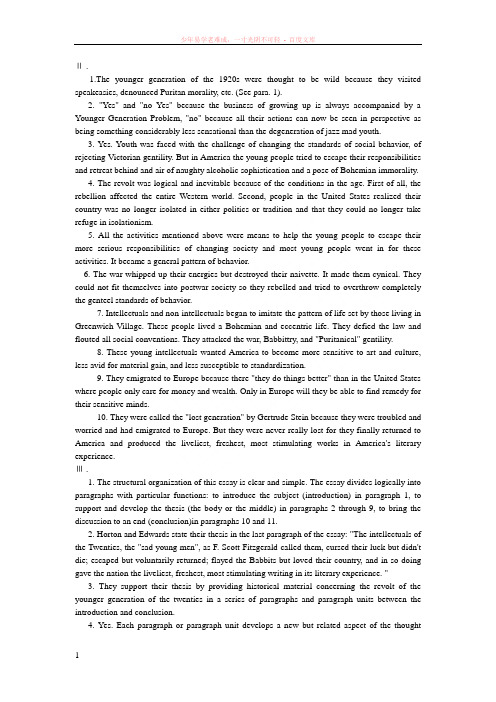
Ⅱ .1.The younger generation of the 1920s were thought to be wild because they visited speakeasies, denounced Puritan morality, etc. (See para. 1).2. "Yes" and "no Yes" because the business of growing up is always accompanied by a Younger Generation Problem, "no" because all their actions can now be seen in perspective as being something considerably less sensational than the degeneration of jazz mad youth.3. Yes. Youth was faced with the challenge of changing the standards of social behavior, of rejecting Victorian gentility. But in America the young people tried to escape their responsibilities and retreat behind and air of naughty alcoholic sophistication and a pose of Bohemian immorality.4. The revolt was logical and inevitable because of the conditions in the age. First of all, the rebellion affected the entire Western world. Second, people in the United States realized their country was no longer isolated in either politics or tradition and that they could no longer take refuge in isolationism.5. All the activities mentioned above were means to help the young people to escape their more serious responsibilities of changing society and most young people went in for these activities. It became a general pattern of behavior.6. The war whipped up their energies but destroyed their naivette. It made them cynical. They could not fit themselves into postwar society so they rebelled and tried to overthrow completely the genteel standards of behavior.7. Intellectuals and non-intellectuals began to imitate the pattern of life set by those living in Greenwich Village. These people lived a Bohemian and eccentric life. They defied the law and flouted all social conventions. They attacked the war, Babbittry, and "Puritanical" gentility.8. These young intellectuals wanted America to become more sensitive to art and culture, less avid for material gain, and less susceptible to standardization.9. They emigrated to Europe because there "they do things better" than in the United States where people only care for money and wealth. Only in Europe will they be able to find remedy for their sensitive minds.10. They were called the "lost generation" by Gertrude Stein because they were troubled and worried and had emigrated to Europe. But they were never really lost for they finally returned to America and produced the liveliest, freshest, most stimulating works in America's literary experience.Ⅲ .1. The structural organization of this essay is clear and simple. The essay divides logically into paragraphs with particular functions: to introduce the subject (introduction) in paragraph 1, to support and develop the thesis (the body or the middle) in paragraphs 2 through 9, to bring the discussion to an end (conclusion)in paragraphs 10 and 11.2. Horton and Edwards state their thesis in the last paragraph of the essay: "The intellectuals of the Twenties, the "sad young men", as F. Scott Fitzgerald called them, cursed their luck but didn't die; escaped but voluntarily returned; flayed the Babbits but loved their country, and in so doing gave the nation the liveliest, freshest, most stimulating writing in its literary experience. "3. They support their thesis by providing historical material concerning the revolt of the younger generation of the twenties in a series of paragraphs and paragraph units between the introduction and conclusion.4. Yes. Each paragraph or paragraph unit develops a new but related aspect of the thoughtstated in the thesis. Frequently the first sentence of these middle paragraphs states clearly the main idea of the material that follows and indicates a new but related stage of the developing thought. For example : The rejection of Victorian gentility was, in any case, inevitable. (paragraph 3). The rebellion started with World War I . (paragraph 5) Greenwich Village set the pattern. (paragraph 7) Meanwhile the true intellectuals were far from flattered. (paragraph 9).5. The two paragraphs form a single unit. The writers begin with a clearly stated main idea -- Greenwich Village set the pattern and use paragraph 7 to explain Greenwich Village to the reader, following in paragraph 8 with supporting material showing how the rest of the country imitated life in the "Village".6.Student' s choice.7.Student's choice.III. Paraphrase1.At the very mention of this post-war period, middle-aged people begin to think about it longingly.2.In any case, an American could not avoid casting aside抛弃;废除its middle-class respectability and affected做作的;假装的refinement精制;文雅.3.The war only helped to speed up the breakdown of the Victorian social structure.4.In America at least, the young people were strongly inclined to shirk their responsibilities. They pretended to be worldly-wise老于世故的;精于世故的, drinking and behaving naughtily.5.The young people found greater pleasure in their drinking because Prohibition, by making drinking unlawful, added a sense of adventure.6.Our young men joined the armies of foreign countries to fight in the war.7.The young people wanted to take part in the glorious adventure before the whole war ended.8.These young people could no longer adapt themselves to lives in their home towns or their families.9. The returning veteran also had to face the stupid cynicism of the victorious allies in Versailles who acted as cynically as Napoleon did, and to face Prohibition which the lawmakers hypocritically assumed would do good to the people.10. (Under all this force and pressure) something in the youth of America, who were already very tense, had to break down.11. It was only natural that hopeful young Writers whose minds and writings were filled with violent anger against war, Babbitry, and "Puritanical" gentility, should come in great numbers to live in Greenwich Village, the traditional artistic centre.12. Each town was proud that it had a group of wild, reckless people, who lived unconventional lives.IV. A.1. speakeasy:a place where alcoholic drinks are sold illegally,esp.such a place in the U.S.during Prohibition2. sheik: a masterful有驾驭力的man to whom women are supposed to be irresistibly attracted3. flapper: (Americanism) (in the 1920s) a young woman considered bold and unconventionalin action and dress4. drugstore cowboy: a western movie extra群众演员who loafs游荡in front of drugstores betweenpictures5. Prohibition: the forbidding by law of the manufacture, transportation, and sale of alcoholic liquors for beverage purposes, specifically in the U. S., the period (1920-1933) of Prohibition by Federal law6. orgy: any wild, riotous暴乱的;狂欢的, licentious放肆的;放纵的merrymaking寻欢作乐; debauchery放荡;纵情酒色7. soap opera: a daytime radio or television serial drama of a highly melodramatic情节剧的,sentimental nature.It has been so called since many original sponsors were soap companies8. action: military combat in general9. whip up: rouse; excite10. give: bend, sink, move, break down, yield, etc. from force or pressure11.burden:repeated central idea; theme12.keep up with the Joneses:strive to get all the material things one’s neighbors or associates have13.write off:drop from从…除去considerationB.1.flourish意为向很理想的状况发展或正处于该状况,即发展的鼎盛时期。
高级英语第二册第五课第一部分
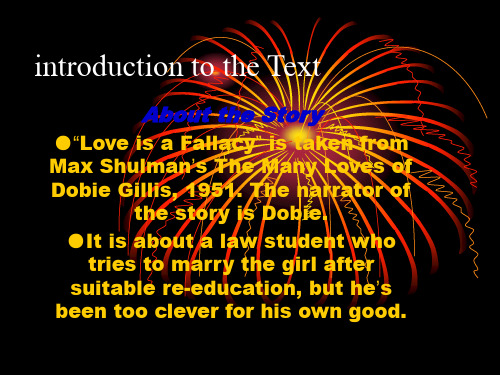
Introduction to the Text
• The denouement follows rapidly and ends on a very ironic tone. The raccoon coat which he gave to Petey Burch for the privilege of dating his girl, the raccoon coat which the narrator disliked and abhorred, was the instrument of his undoing. Polly Espy promised to go steady with Petey Burch because he owned a raccoon coat, a coat that all fashionable people on campus were wearing.
兰姆是一个世所罕见的性情欢快富有进取心的人他那笔下的散文古瓷器和梦中的孩子无拘无束自由奔放
introduction toy
●“Love is a Fallacy” is taken from Max Shulman’s The Many Loves of Dobie Gillis, 1951. The narrator of the story is Dobie. ●It is about a law student who tries to marry the girl after suitable re-education, but he’s been too clever for his own good.
Organizational Pattern
• Section I (Paras.1-3): the author’s note. • 1. The author’s idea about this story. • 2. The author’s idea about the purpose of this story.
高级英语第二册 第五课课件 Love is a Fallacy
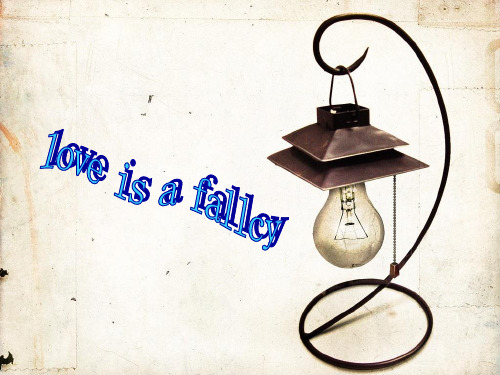
– bearing: n. the way a person holds his body or behaves; deportment 举止;姿势; 风度
• an upright, proud bearing 气宇轩昂、自豪 • She has a very modest bearing. 她举止淑静
shrewdly ['ʃru:dli] adv. 精明地, 敏锐地, 机灵地
• His glance glittered shrewdly.他的目光机 警地闪动着。 • Well, that's for you to say," he answered shrewdly. ―哦,那就由你说了,"他精明地回答。
• Have you get a product of this specification? 不知贵方有没有这种规格的产品? • Can you give me a price list with specification? 你能否给我一份有规格说明的价目单吗?
• Beautiful she was. She was not yet of pin-up proportions, but I felt sure that time would supply the lack.(para22) →Though her figure was not as good as women on the pin-up, I was sure she would be better with sufficient time.
• With one omission, Polly fitted these specifications perfectly.(para21) →Polly met all these requirements except one. • specification [ˌspesifi'kei ən] ʃ a detailed plan or set of descriptions or directions 规格; 说明
高级英语第二册第五课Vocabulary 5
3
• unfetter (v.): free from fetters ; free from restraint of any kind ; liberate-除掉…的脚镣;解放;使获得 自由
4
• limp (adj.): lacking or having lost stiffness;flaccid;drooping,wilted 柔软的
18
• craze (n.): something that is currently the fashion;fad- 一时的风 尚;风行一时的东西;时髦
19
• acme (n.): the highest point;point of cappendicitis (n.): inflammation of the vermiform appendix-阑尾炎
• narrowly (adv.): closely;carefully; thoroughly仔细地;严密地
32
• attic (n.): the room or space just below the roof of a house; garret顶 楼,阁楼
11
• astute (adj.): having or showing a clever or shrewd mind : cunning ; crafty;wily 聪明的,敏锐的;精明的; 狡猾的
12
• dynamo (n.): generator发动机
13
• scale (n.): either of the shallow dishes or pans of a balance 秤盘;天 平盘
14
• penetrating (adj.): sharp;piercing锐 利的
高级英语2-Lesson5-课文分析
Background knowledge:
The Author—Rod W. Horton(1910-)
Born in White Plains N.Y.
Instructor, New York University(1937—45)
Assistant professor(1945—49)
romanticize: v. to make sth seem more attractive or interesting than it really is 使浪漫 化;使传奇化;使更加富有吸引力 sensationally romanticized: (This so-called problem) was treated in a passionate, idealized manner to shock, thrill, and rouse the interest of people. What of the Twenties has been most commented upon and romanticized? . The Revolt of the Younger Generation Translation:
illicit: illegal, forbidden by the law adj. 法律不允许的,非法的;不正当的 thrill: n. tremor of excitement deliciously illicit thrill: An improper action but very enjoyable and exciting. A visit to a speakeasy was improper or prohibited because these places sold alcoholic drinks illegally. This explains the “illicit thrill”. speakeasy: (Americanism) A place where alcoholic drinks are sold illegally, such a place in the US during Prohibition(the period 1920-1933). denunciation: n. the act of denouncing Puritan morality: Extreme or excessive strictness in matters of morals. Strict Puritans regarded drinking, gambling and even participation in theatrical performances as punishable offences.
高级英语(第三版)第二册第五课 The Sad Young Men
• To require students to memorize all the new words in the text
Background information
HOMEห้องสมุดไป่ตู้
Victorian Morality Puritanism
The Roaring 20’s
Prohibition Greenwich Village
Bohemian life
Textual Structure
Introduction
Para 1
Development
Para 2-9
Conclusion
高级英语(第三版)第二册第五课 The Sad Young Men
Teaching Aims
• To familiarize students with the social conditions of American 1920’s
• To help students to understand the author’s attitude and intention in the text
time?
Words and Expressions
• sensationally romanticized: treated in a passionate, idealized manner to shock thrill and rouse the interest of people.
• nostalgic: looking for something far away or long ago or for former happy circumstance 怀旧的
高级英语第二册_lesson_5_Love_is_a_fallacy_para_31-52教学内容
Canny : ['kæ ni]
(adj.) showing self-interest and shrewdness in dealing with others 精明的,谨慎的;节约的
E.g.
But only until canny web users figured out the way to
Para.50 I sat down in a chair and pretended to read a book, but out
of the corner of my eye I kept watching Petey. He was a torn man. First he looked at the coat with the expression of waif [weɪf] at a bakery window.
Para.43-Para.45 "Would you like it?" I asked. “你喜欢吗?”我问道。
"Oh yes!" he cried, clutching the greasy ['grisi] pelt [pɛlt] to him. Then a canny ['kæ ni] look came into his eyes. "What do you want for it?"
Para.50 Back and forth his head swiveled ['swɪvl] , desire waxing
['wæ ksɪŋ] , resolution waning ['weɪnɪŋ] . Finally he didn't turn away at all; he just stood and stared with mad lust [lʌst] at the coat.
- 1、下载文档前请自行甄别文档内容的完整性,平台不提供额外的编辑、内容补充、找答案等附加服务。
- 2、"仅部分预览"的文档,不可在线预览部分如存在完整性等问题,可反馈申请退款(可完整预览的文档不适用该条件!)。
- 3、如文档侵犯您的权益,请联系客服反馈,我们会尽快为您处理(人工客服工作时间:9:00-18:30)。
Organizational Pattern
• Section III (Paras.60-124): the teaching of 8 logical fallacies
• 6. (paras.97-98) Interposition. He wants to give the girl back. • 7. (paras.99-104) the teaching of Misericordiam • 8Байду номын сангаас (paras.105-108) the teaching of False Analogy • 9. (paras.109-114) the teaching of Hypothesis Contrary to Fact • 10. (paras.115-124) the teaching of Back
Organizational Pattern
• Section II (Paras.4-59): the bargain between the law student and his roommate over the exchange of the girl.
• 4. (paras. 28-40) sounding out(探听;探 询) the relationship between Petey and Polly. • 5. (paras.40-59) unethical(不道德的) transaction over Polly
introduction to the Text
About the Story
●“Love is a Fallacy” is taken from Max Shulman’s The Many Loves of Dobie Gillis, 1951. The narrator of the story is Dobie. ●It is about a law student who tries to marry the girl after suitable re-education, but he’s been too clever for his own good.
Introduction to the Text
About the Story
• This text is a piece of narrative writing, a story. The narrator of the story, Dobie Gillis, a freshman in a law school, is the hero or protagonist. He struggles against two antagonists: Petey Burch, his roommate whose girlfriend he plans to steal; and Polly Espy, the girl he intends to marry after suitable re-education. • The climax of the story is reached in paragraphs147 to150 when Polly refuses to go steady with the narrator because she had already promised to go steady with Petey Burch. Back
Introduction to the Text
• The denouement follows rapidly and ends on a very ironic tone. The raccoon coat which he gave to Petey Burch for the privilege of dating his girl, the raccoon coat which the narrator disliked and abhorred, was the instrument of his undoing. Polly Espy promised to go steady with Petey Burch because he owned a raccoon coat, a coat that all fashionable people on campus were wearing.
Back
Organizational Pattern
• Section II (Paras.4-59): the bargain between the law student and his roommate over the exchange of the girl.
• 1. (para.4) introduction of the narrator: protagonist • 2. (paras.5-21) introduction of the first antagonist: Petey Burch. • He downgrades his roommate, who has nothing upstairs. • 3. (paras.22-27) introduction of the Back
Organizational Pattern
• Section I (Paras.1-3): the author’s note. • 1. The author’s idea about this story. • 2. The author’s idea about the purpose of this story.
• 1. (para.60-61) a survey, first date with the girl, first impression of the girl. He tries to find out how stupid she is. • 2. (paras.62-74) the teaching of Dicto Simpliciter • 3. (paras.75-79) the teaching of Hasty Generalization • 4. (paras.80-85) the teaching of Post
Introduction to the Text
Introduction to the Text
• In desperation the narrator argues that “the things you learn in school don’t have anything to do in life” (para.145) The appeal does not move Polly because she does not reject him on logical grounds. She rejects him because he does not own a raccoon coat as Petey Burch does. At the end of the story, the reader feels the narrator has got what he deserved. He has been too clever for Back his own good.
• The student gives the raccoon coat the roommate wants, and his
Back
Organizational Pattern
• Section III (Paras.60-124): the teaching of 8 logical fallacies
Back
• The whole story is a piece of light, humorous satire. The writer, Max Shulman, is satirizing or making fun of a smug, selfconceited freshman in a law school. The freshman is made the narrator of the story who goes on smugly boasting and singing praises of himself at every conceivable opportunity. From the very beginning (para.4), he begins to heap on(大加颂扬) himself all the beautiful words of praise he can think of— cool, logical, keen, calculating, perspicacious, acute, astute, powerful, precise and penetrating. This exaggerated self-praise and the profuse use of similes and metaphors help to make the satire humorous.
Back
Introduction to the Text
About the Title
• Perhaps Max Shulman wants the reader, after reading the story, to conclude that “love” is an error, a deception and an emotion that does not follow the principles of logic. But the writer, through this story has succeeded perhaps unwittingly(无意地) in revealing what love may sometimes mean in the affluent society. Girls do not want brilliant, Back gifted or educated husbands, but
